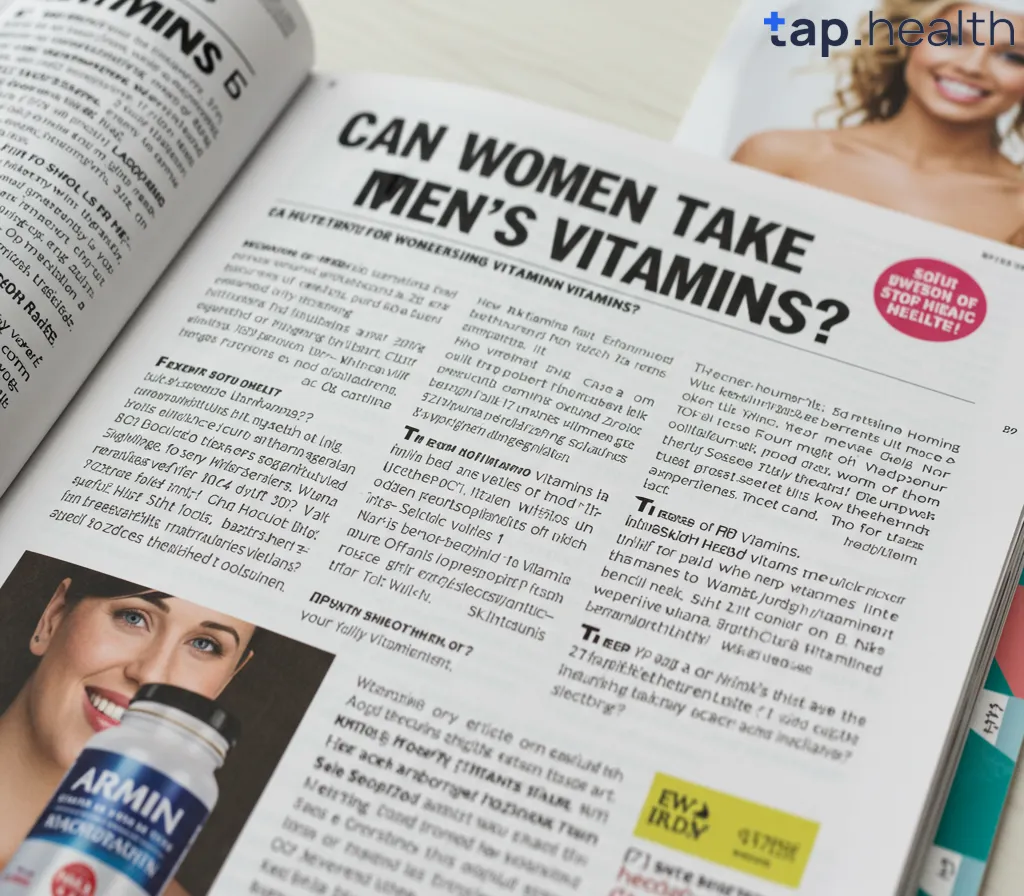You’re standing in the vitamin aisle, staring at two bottles: one labeled “Men’s Multivitamin” and the other “Women’s Multivitamin.” They look almost the same. The prices are similar. But the labels say different things.
So you ask yourself: Can women take men’s vitamins?
Maybe you’ve run out of your usual women’s formula. Maybe the men’s version is on sale. Or maybe someone in your house already takes them, and you’re thinking, Why not just share?
Here’s the short answer:
Yes, women can take men’s vitamins occasionally—but it’s not ideal for long-term use.
Why? Because men’s and women’s bodies have different nutritional needs. The vitamins and minerals in each formula are tailored to those needs. Taking the wrong one regularly could mean you’re getting too much of some nutrients and not enough of others.
In this article, we’ll break it all down in simple, easy-to-understand language—no confusing medical terms, no robotic tone. Just real, clear facts based on research from trusted sources like the National Institutes of Health (NIH), Mayo Clinic, Harvard Health, and the Office on Women’s Health.
We’ll cover:
- The key differences between men’s and women’s vitamins
- Which nutrients are higher or lower in each
- Risks of taking the “wrong” multivitamin
- When it’s okay (and not okay) for women to use men’s formulas
- What women really need in a daily vitamin
- And much more
Let’s get into it.
Why Are There Separate Vitamins for Men and Women?
You wouldn’t wear someone else’s prescription glasses, right? Even if they look the same, they’re made for a different vision need.
Multivitamins work the same way. Men and women have different bodies, hormones, lifestyles, and health risks—so their vitamin needs are different too.
That’s why supplement companies create separate formulas. These aren’t just marketing tricks. The differences are based on real science and long-term health research.
Let’s look at the main reasons why men’s and women’s vitamins are not the same.
1. Iron Needs Are Different
This is one of the biggest differences.
Women of childbearing age (roughly 13–50 years old) need more iron than men because they lose blood during their monthly periods. Without enough iron, they can develop anemia, which causes fatigue, weakness, and pale skin.
So, most women’s multivitamins contain iron—usually between 18 mg and 27 mg.
But men don’t lose blood monthly, and they rarely need extra iron. In fact, too much iron can be harmful for men and postmenopausal women. It can build up in the organs and increase the risk of heart disease and liver damage.
That’s why men’s multivitamins usually contain little or no iron.
👉 Bottom line: If a woman takes a men’s vitamin long-term, she might not get enough iron—especially if she has heavy periods.
2. Folic Acid (Folate) Is Critical for Women
Folic acid (a form of vitamin B9) is super important for women—especially those who could become pregnant.
It helps prevent serious birth defects of the brain and spine (called neural tube defects) in early pregnancy. Many women don’t even know they’re pregnant in the first few weeks, so getting enough folic acid before conception is key.
That’s why:
- Women’s multivitamins often contain 400–800 mcg of folic acid
- Men’s formulas usually have less or none, since men don’t need it for fetal development
Even if you’re not planning a baby, it’s smart to get enough folic acid if you’re sexually active and could get pregnant.
3. Calcium and Vitamin D Needs Change With Age
Women are at higher risk for osteoporosis (weak, brittle bones), especially after menopause when estrogen levels drop.
That’s why:
- Women’s vitamins often include more calcium and vitamin D—nutrients that keep bones strong
- Men’s formulas may have less, since men typically lose bone density more slowly
However, some women’s multivitamins don’t contain enough calcium to meet daily needs (1,000–1,200 mg). You usually need to get extra from food or a separate supplement.
Also, too much calcium from supplements has been linked to heart issues in some studies, so balance is important.
4. Vitamin A and Beta-Carotene: A Delicate Balance
Some men’s multivitamins contain higher levels of vitamin A or beta-carotene (a form of vitamin A). This is because vitamin A supports vision, immunity, and skin health—areas that matter for overall male health.
But too much vitamin A can be risky for women, especially during pregnancy. High doses of preformed vitamin A (not beta-carotene) can cause birth defects.
That’s why:
- Women’s formulas often use beta-carotene instead of preformed vitamin A
- Men’s formulas may include more preformed vitamin A
Always check the label. Look for “retinol” or “retinyl palmitate”—those are forms of preformed vitamin A.
5. B Vitamins and Energy Metabolism
Both men and women need B vitamins (like B6, B12, and folate) to turn food into energy and support brain function.
But men often have higher calorie needs and more muscle mass, so some men’s formulas include slightly higher B-vitamin doses to support energy and metabolism.
For women, the focus is more on B6 for PMS relief and B12 for nerve and blood cell health—especially as they age.
Can Women Take Men’s Vitamins Occasionally?
Yes, taking a men’s vitamin once in a while is not dangerous.
For example:
- You ran out of your own vitamins
- You’re traveling and only have access to a men’s formula
- You’re sharing a bottle with a partner temporarily
One or two doses won’t hurt you. Your body can handle small imbalances for a short time.
But don’t make it a habit. Over weeks or months, the missing or excess nutrients can add up and cause problems.
What Happens If a Woman Takes Men’s Vitamins Every Day?
Long-term use of men’s vitamins by women can lead to:
1. Iron Deficiency
If you’re a woman of reproductive age and take a men’s multivitamin daily, you’re likely not getting enough iron.
Over time, this can lead to:
- Fatigue
- Weakness
- Shortness of breath
- Pale skin
- Hair loss
These are signs of iron-deficiency anemia, which affects millions of women.
Even if you eat iron-rich foods (like red meat, beans, or spinach), a daily multivitamin with iron helps ensure you meet your needs—especially if your diet isn’t perfect.
2. Missing Key Nutrients for Women
Men’s vitamins often lack:
- Enough folic acid
- Sufficient calcium or vitamin D
- Specialized blends for hormonal balance or PMS
Women’s formulas may also include:
- Chasteberry or B6 for menstrual support
- Green tea or antioxidants for metabolism
- Lutein for eye health (more common in women’s formulas)
You won’t get these benefits from a men’s vitamin.
3. Too Much of Certain Nutrients
Some men’s multivitamins pack in high doses of:
- Vitamin A (as retinol)
- Zinc
- Selenium
- Niacin (vitamin B3)
While these are important, too much can be harmful.
For example:
- Excess vitamin A can cause liver damage and birth defects
- Too much zinc can lower good cholesterol and cause nausea
- High selenium over time may lead to hair loss and nerve damage
Women generally need lower amounts of these than men, so men’s formulas may exceed safe limits with daily use.
Are There Any Benefits for Women Taking Men’s Vitamins?
In rare cases, yes—but only under specific circumstances.
1. Postmenopausal Women
After menopause, women no longer need extra iron. In fact, their iron needs drop to the same level as men (8 mg per day).
At this stage:
- Iron supplements aren’t necessary unless prescribed
- Excess iron may even be harmful
So, a postmenopausal woman might safely use a men’s multivitamin, especially if it has higher vitamin D, B12, or antioxidants.
But she should still check:
- Calcium intake (may need a separate supplement)
- Folic acid (still important for heart and cell health)
- Overall nutrient balance
2. Women on a Doctor’s Recommendation
Some women may be advised by their doctor to take a men’s formula if:
- They have no risk of anemia
- They’re getting enough iron from food
- They need higher doses of certain nutrients (like B12 or zinc)
But this should only be done under medical supervision.
What Should Women Look for in a Daily Vitamin?
Not all women’s multivitamins are created equal. Here’s what to look for on the label:
1. Iron (if you’re under 50)
- 18 mg is standard for adult women
- 27 mg for pregnant women
- Skip iron if you’re postmenopausal or have hemochromatosis (a condition that causes iron overload)
2. Folic Acid
- At least 400 mcg (800 mcg if planning pregnancy)
- Look for “folic acid” or “methylfolate” on the label
3. Vitamin D
- 600–800 IU (15–20 mcg) for most women
- Up to 1,000 IU if you have low sun exposure or deficiency
Vitamin D helps with calcium absorption and immune support.
4. Calcium
- Multivitamins usually contain 200–300 mg—not enough to meet daily needs
- Get the rest from food (dairy, leafy greens, fortified products) or a separate supplement
5. B Vitamins
- B6: 1.3–2 mg (helps with mood and PMS)
- B12: 2.4 mcg (important for energy and nerves)
- Biotin: Often included for hair and nail health (though evidence is mixed)
6. Magnesium, Zinc, and Antioxidants
- Magnesium: 100–200 mg (supports sleep and muscle function)
- Zinc: 8–11 mg (boosts immunity)
- Vitamin E, C, selenium: For antioxidant protection
Can Men Take Women’s Vitamins?
Yes, men can take women’s vitamins occasionally—but it’s not ideal for them either.
Men who take women’s formulas long-term may get:
- Too much iron (risk of buildup in the body)
- Not enough zinc or B vitamins (important for testosterone and energy)
So the rule goes both ways: Use the formula designed for your gender and life stage.
Are “Unisex” or “One-Size-Fits-All” Vitamins a Good Option?
Some brands sell “unisex” or “all-in-one” multivitamins. They claim to work for everyone.
But here’s the truth: They’re usually a compromise.
They often:
- Contain little or no iron (to avoid risk for men and older women)
- Have lower doses of key nutrients
- Lack specialized support for gender-specific needs
If you’re a younger woman, you’ll likely miss out on iron and folic acid. If you’re a man, you might not get enough zinc or B12.
So, unless you’re getting nutrients from a perfect diet, gender-specific formulas are usually better.
What If I’m Vegan or Have Dietary Restrictions?
Diet matters more than ever when choosing a multivitamin.
For Vegetarian or Vegan Women:
- Look for B12 (often low in plant-based diets)
- Check for iron (plant-based iron is harder to absorb)
- Choose vitamin D2 or D3 from lichen (not animal sources)
Many women’s formulas are now vegan-friendly.
For Women with Digestive Issues:
- Avoid gummies if you have blood sugar concerns (they contain sugar)
- Try capsules or tablets if you have trouble swallowing
- Consider a liquid or chewable form if you have absorption problems (like with Crohn’s or celiac disease)
Can Taking the Wrong Vitamin Make You Sick?
Not usually from one pill. But long-term misuse can cause health problems.
For example:
- Too little iron → anemia, fatigue, poor concentration
- Too much vitamin A → liver damage, dizziness, birth defects
- Excess zinc → nausea, low HDL (good) cholesterol
- Missing folic acid → higher risk of birth defects if pregnant
Your body needs balance. That’s why it’s best to take a vitamin made for your body.
How to Choose the Right Multivitamin for You
Follow these simple steps:
1. Know Your Life Stage
- Teen girls: Need iron and calcium for growth
- Adult women (19–50): Need iron, folic acid, B vitamins
- Pregnant women: Need extra folic acid, iron, and DHA (an omega-3)
- Postmenopausal women: Need calcium, vitamin D, B12, less iron
2. Read the Label
Look for:
- USP, NSF, or ConsumerLab seal (means it’s tested for quality)
- No unnecessary fillers or artificial colors
- Nutrients close to 100% of the Daily Value (DV)
Avoid “mega-dose” formulas unless prescribed.
3. Talk to Your Doctor
Especially if you:
- Are pregnant or breastfeeding
- Have a chronic condition (like diabetes or kidney disease)
- Take medications (some vitamins interact with drugs)
- Follow a restrictive diet
A blood test can show if you’re low in iron, B12, or vitamin D—so you can choose the right supplement.
Can You Take Both Men’s and Women’s Vitamins?
No. Never take both at the same time.
Doing so can lead to dangerous overdoses of certain vitamins and minerals.
For example:
- Iron: 18 mg (women’s) + 0 mg (men’s) = fine
But if you take two women’s pills? 36 mg—too much. - Vitamin A: Could easily exceed safe limits
- Zinc, selenium, niacin: Risk of toxicity
One multivitamin per day is enough.
What About Gummy Vitamins?
Gummy multivitamins are popular because they taste good and are easy to take.
But there are a few things to watch out for:
1. They Often Lack Iron
Most gummy vitamins don’t contain iron because it doesn’t taste good and can make gummies break down.
So if you’re a woman who needs iron, gummies may not be the best choice.
2. They May Have Less of Key Nutrients
Gummies have space limits. They often contain lower doses of:
- Calcium
- Magnesium
- B vitamins
Check the label to make sure you’re getting enough.
3. They Contain Sugar
Many gummy vitamins have 2–5 grams of sugar per serving. That’s like eating a piece of candy.
If you’re watching your sugar intake (for diabetes or weight), this matters.
Look for sugar-free or low-sugar options.
Final Thoughts: Can Women Take Men’s Vitamins?
Yes—women can take men’s vitamins in a pinch, but they shouldn’t make it a regular habit.
Here’s the bottom line:
- Men’s and women’s bodies have different nutritional needs
- Women need more iron and folic acid, especially before menopause
- Men’s formulas often lack these and may contain too much of other nutrients
- Long-term use can lead to deficiencies or excesses
- Postmenopausal women may be able to use men’s formulas safely—but should still check with a doctor
The best choice? Use a high-quality multivitamin made for women, based on your age, lifestyle, and health needs.
And remember: Vitamins are meant to fill gaps—not replace a healthy diet.
Eat plenty of fruits, vegetables, whole grains, and lean proteins. Use your multivitamin as a safety net, not a magic pill.
When in doubt, ask your doctor or a registered dietitian. They can help you pick the right one for you.
Frequently Asked Questions (FAQ) on Can women take men’s vitamins?
Can women take men’s vitamins?
Yes, women can take men’s vitamins occasionally, but not long-term. Men’s formulas often lack iron and folic acid, which women need, and may contain too much of other nutrients.
Is it bad for a woman to take men’s vitamins every day?
Yes, long-term use can lead to iron deficiency, low folic acid, and excess intake of nutrients like vitamin A or zinc, which can be harmful.
What’s the main difference between men’s and women’s multivitamins?
The biggest differences are iron (higher in women’s) and folic acid (critical for women). Men’s formulas often have more B vitamins and antioxidants, while women’s include bone-supporting nutrients like calcium and vitamin D.
Can a woman get anemia from taking men’s vitamins?
Yes, if she’s of childbearing age and takes a men’s vitamin regularly, she may not get enough iron, increasing the risk of iron-deficiency anemia.
Do men’s vitamins have folic acid?
Some do, but usually in lower amounts than women’s formulas. Since men don’t need folic acid for pregnancy, it’s often reduced or left out.
Can postmenopausal women take men’s vitamins?
Yes, often. After menopause, women no longer need extra iron, so a men’s formula may be safe. But they should still ensure they’re getting enough calcium, vitamin D, and B12.
Can men take women’s vitamins?
Men can take them occasionally, but long-term use may lead to too much iron and not enough zinc or B vitamins, which are important for male health.
Are unisex multivitamins good for women?
They can work in a pinch, but they often lack iron and folic acid. Women with higher nutrient needs should choose a gender-specific formula.
Do gummy vitamins have iron?
Most do not. Iron doesn’t mix well with gummy textures and tastes bad. Women who need iron should choose tablet or capsule forms.
Can taking men’s vitamins affect pregnancy?
Yes. If a woman planning pregnancy takes a men’s vitamin, she may not get enough folic acid, increasing the risk of birth defects. Always use a prenatal or women’s formula if trying to conceive.
How much iron should a woman’s vitamin have?
18 mg for most adult women. 27 mg for pregnant women. Postmenopausal women need only 8 mg—same as men.
What vitamins should women focus on?
Iron, folic acid, vitamin D, calcium, B12, and magnesium are key. Antioxidants like vitamins C and E also support overall health.
Can you overdose on vitamins from multivitamins?
Yes, especially with fat-soluble vitamins (A, D, E, K) and minerals like iron and zinc. Never take more than the recommended dose.
Should I take a multivitamin if I eat healthy?
Even healthy eaters can miss key nutrients. A multivitamin can help fill gaps, especially for iron, vitamin D, and B12.
Can vitamins replace a healthy diet?
No. Vitamins are supplements, not substitutes. They work best when combined with a balanced diet rich in whole foods.
Choosing the right multivitamin isn’t about gender pride—it’s about giving your body what it really needs. So take a moment, read the label, and pick the one that’s made for you. Your health will thank you.



